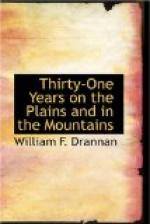The reader will understand that in those early days we had only muzzle-loading guns, and for every one of those we had to have a pair of bullet-moulds the size of the rifle, and before starting out on an expedition it was necessary to mould enough bullets to last several weeks, if not the entire trip, and when you realize that almost any time we were liable to get into a “scrap” with the Indians, you can understand that it required a great number of these little leaden missiles to accommodate the red brethren, as well as to meet other uses.
That evening after I had gone to bed, Mr. Hughes said:
“Kit, what are you going to do with that boy?”
“What boy?” asked Uncle Kit, as if he were astonished.
“Why, Willie. What are you going to do with him while we are away trapping?”
“Why, take him along to help us, of course.”
“Thunderation!” exclaimed Hughes; “he will only be a bother to us in the mountains.”
I had been with Kit Carson three months, and this was the first time I had seen him, apparently, out of humor. But at Hughes’ last remark, he said in a decidedly angry tone:
“Jim Hughes, I want you to understand that wherever I go that boy can go, too, if he likes.”
Hughes seeing that Carson did not like what he had said about “that boy,” turned the matter off by saying that he had only made the remark to tease the boy.
Next morning Uncle Kit started a Mexican lad out to round up the horses, and the next two days were spent in fixing up our pack-saddles preparatory for the trip.
Our horses were as fat as seals, as there was no end to the range for them in this part of the country.
All being in readiness we pulled out from Taos, four of us, Uncle Kit, Mr. Hughes, myself and a Mexican boy named Juan. The latter went along to bring our horses back home.
We crossed back over that spur of the Rocky Mountains that we had came in through, and struck the Arkansas river near where Pueblo, Colo., now stands, and from here we polled for the headwaters of that river, carefully examining every stream we came to for beaver sign.
We saw abundance of game on the trip, such as antelope, deer and buffalo.
When we had traveled up the river about two days, Uncle Kit thought it was not best to take the horses any further as the country was now too rough for them, so we spent the next two days caching our cargo.
As some may not know what a cache is, I will explain.
Cache is French for “hide.” A hole is dug in the ground and the things to be hidden are put in there and covered with brush, then with dirt, then more brush and more dirt, and the whole is covered with turf, to make the surface look as natural as possible, so that it is not likely to be discovered by Indians at a distance.
We having about a thousand pounds of stores to cache, it was no small job.




